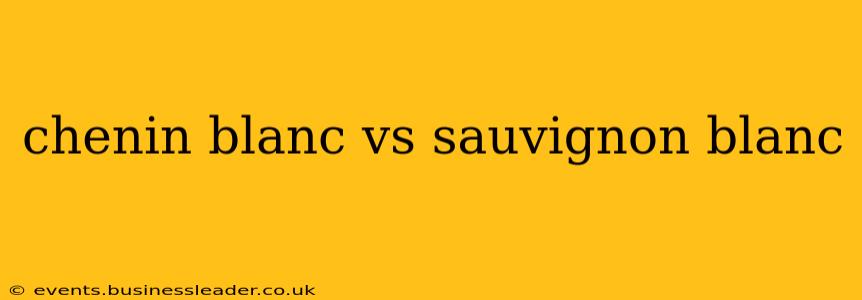Choosing between Chenin Blanc and Sauvignon Blanc can feel like navigating a wine labyrinth. Both are popular white varietals, but their distinct characteristics offer vastly different drinking experiences. This comprehensive guide will delve into the nuances of each grape, helping you understand their unique profiles and appreciate the best occasions for each.
What is Chenin Blanc?
Chenin Blanc, a grape with a rich history deeply rooted in the Loire Valley of France, is celebrated for its versatility. It can produce wines ranging from bone-dry and crisp to lusciously sweet, sparkling, and even aged versions that rival the complexity of great white Burgundies. This adaptability is a testament to the grape's resilience and its ability to express the terroir—the unique environmental factors influencing the grape’s characteristics—with remarkable precision.
Key Characteristics of Chenin Blanc:
- Acidity: High acidity is a hallmark of Chenin Blanc, providing a vibrant structure and a refreshing quality that cuts through richness.
- Aromas: Expect notes of honey, quince, chamomile, beeswax, and sometimes subtle hints of petrol (especially in aged examples), depending on the winemaking style.
- Flavors: The flavor profile mirrors the aromatics, often displaying a compelling balance of fruitiness and minerality. The sweetness level varies dramatically based on the wine's style.
- Body: Chenin Blanc wines can range from light-bodied to medium-bodied, again depending on the style.
What is Sauvignon Blanc?
Sauvignon Blanc, another globally renowned white grape, is known for its crisp, herbaceous character. While it, too, demonstrates regional variations, its defining traits remain consistently recognizable across different wine-producing regions. It’s a grape that thrives in cooler climates, producing wines with a distinct aromatic profile.
Key Characteristics of Sauvignon Blanc:
- Acidity: High acidity is also a defining characteristic, providing a refreshing, zesty quality.
- Aromas: Expect pronounced herbaceous notes like grassy grass, green bell pepper, and sometimes even cat pee (a controversial but common descriptor). Tropical fruit notes like grapefruit and passionfruit are also prevalent.
- Flavors: Flavors often mirror the aromatics, with the herbaceousness complemented by citrus and sometimes tropical fruit notes.
- Body: Sauvignon Blanc wines are generally light to medium-bodied.
Chenin Blanc vs Sauvignon Blanc: A Detailed Comparison
| Feature | Chenin Blanc | Sauvignon Blanc |
|---|---|---|
| Acidity | High | High |
| Aromas | Honey, quince, beeswax, chamomile, petrol (aged) | Grassy, herbaceous, grapefruit, passionfruit |
| Flavors | Honeyed fruit, mineral, sometimes floral | Herbaceous, citrus, tropical fruit |
| Body | Light to medium-bodied | Light to medium-bodied |
| Sweetness | Dry to very sweet | Primarily dry |
| Aging Potential | Excellent (especially dry styles) | Moderate |
| Food Pairing | Rich shellfish, poultry, cheeses | Salads, goat cheese, seafood |
What are the best food pairings for Chenin Blanc?
Chenin Blanc's versatility extends to its food pairings. Its high acidity and complex flavor profile makes it a superb match for:
- Rich shellfish: The acidity cuts through the richness of lobster or scallops.
- Poultry: The wine's complexity complements the flavors of roasted chicken or turkey.
- Cheeses: Especially aged cheeses like goat cheese or aged cheddar.
What are the best food pairings for Sauvignon Blanc?
Sauvignon Blanc's crisp, herbaceous notes make it a classic pairing for:
- Salads: The bright acidity complements the fresh vegetables.
- Goat cheese: The herbaceous notes of the wine complement the tangy cheese.
- Seafood: Lighter seafood dishes like grilled fish or shrimp pair well with Sauvignon Blanc's refreshing character.
Which wine is right for me?
The choice between Chenin Blanc and Sauvignon Blanc ultimately depends on your personal preference. If you prefer wines with more complex aromatics and a broader range of styles (from bone dry to lusciously sweet), Chenin Blanc is a compelling choice. If you prefer a crisper, more herbaceous, and consistently dry wine, Sauvignon Blanc might be your better option. Experimentation is key to discovering your preference!
